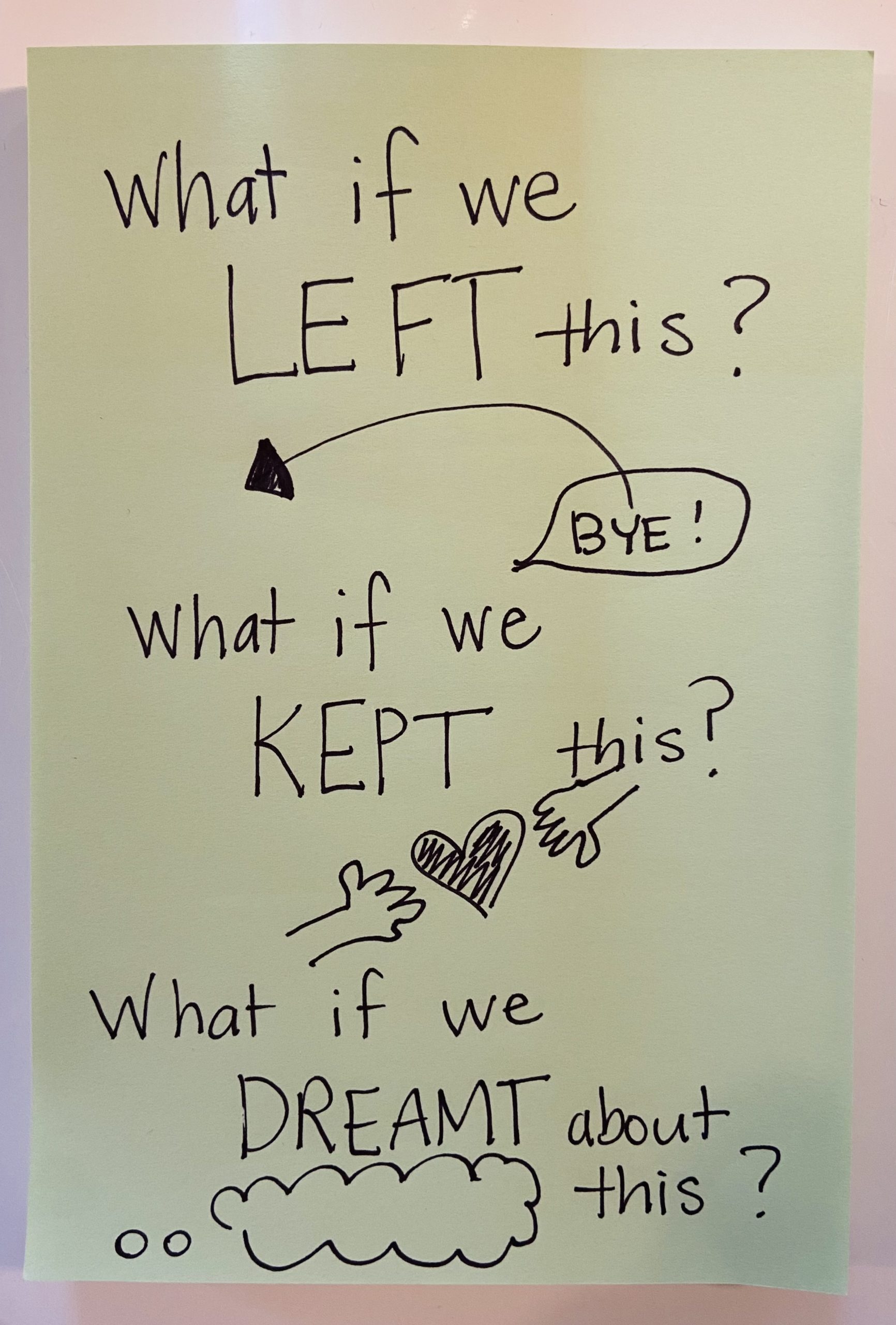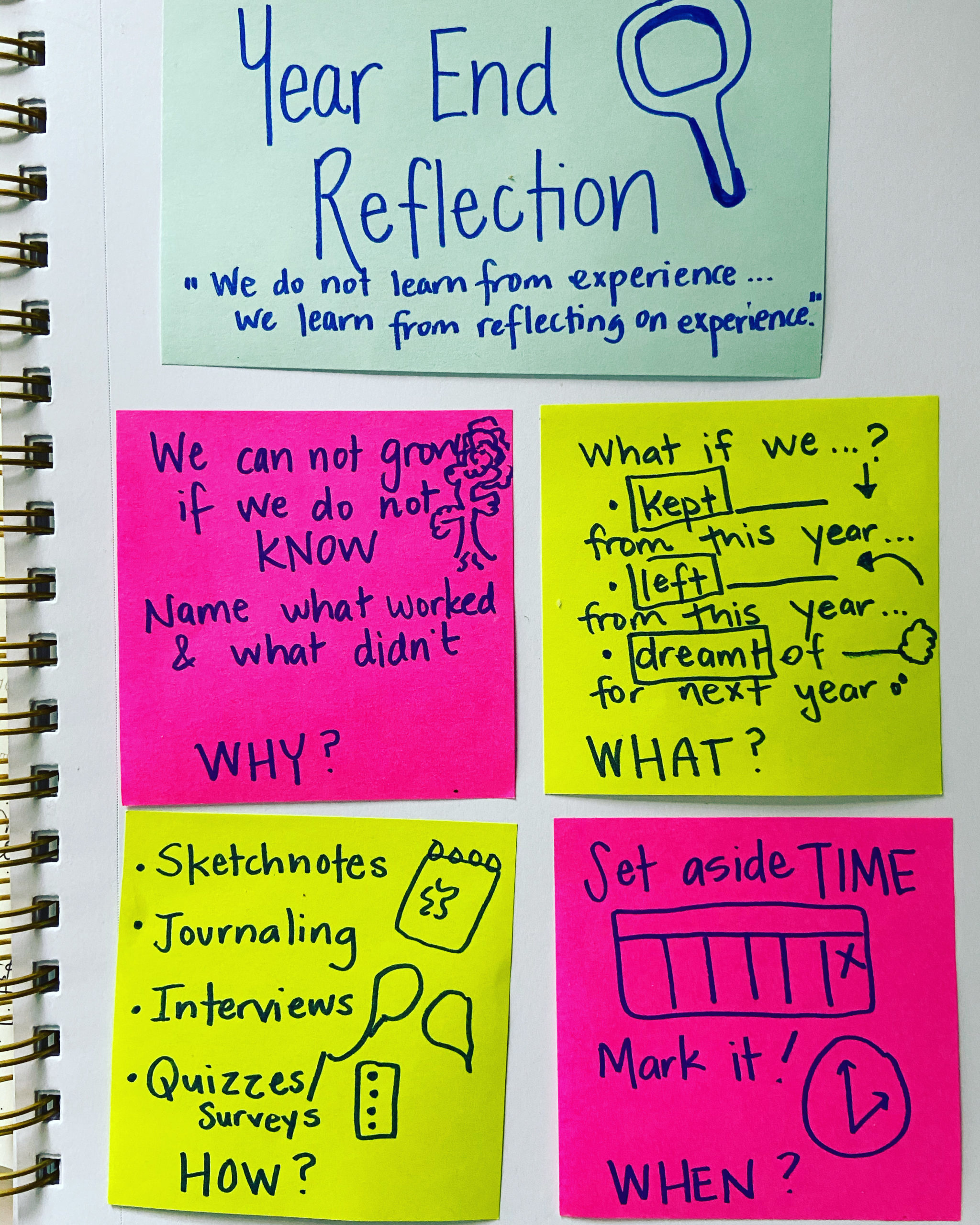It’s been a long year full of tremendous twists and turns, and yet, this school year is ending and students and educators are looking forward to summer vacation. It can be very tempting to look ahead, make a bucket list of the activities for summer, add to your TBR (to be read) list, and think about, well not thinking about as much.
Yet, we do ourselves and our students a disservice if we do not carve out time for reflection. One of my favorite quotes about learning comes from John Dewey. “We do not learn from experience. We learn from reflecting on experience.” The experiences, good bad and ugly from this past year have the potential to really transform our teaching lives. But in the desire to move on from the hard parts, we might miss out on all that we have gained. Instead, let’s take a minute to take stock. In this short blog post, we will offer a few methods and questions for reflection. However, no matter how you choose to reflect, we hope that you will, and in so doing, grow in the process.
Why reflect?
With ever growing to-do lists on sticky notes, computers or the tabs in our brain, it can seem like a luxury to reflect. However, experience reminds us and research shows that when we take time to reflect, we actually become more aware, more resilient and more productive.
Reflection is an important practice not just for us as educators, but for our students as well. We hope that they are thinking about the kind of readers, writers and thinkers they have grown into throughout the year. This is something that we can model before them in our own lives.

What might you reflect upon?
When you stop to think, two things often happen. First, you are bombarded with thoughts that seem to come from all over. “What are we having for dinner? Why didn’t that student achieve the growth I’d expected? What is the new writing curriculum the district adopted for next year? Will I be able to organize my classroom library before we have to leave the building?” Alternatively, sometimes we stop to think and our minds just seem blank. We’ve been going so fast, for so long that we don’t feel we have the energy to think deeply and analytically about what has transpired.
We have found that having guiding questions greatly helps when you are reflecting. We’d like to offer these open-ended prompts as a place to start:
What if we LEFT this from this past year?
What if we KEPT this from this past year?
What if we DREAMT about this for next year?
There is a lot we might never want to have to incorporate into our teaching practices ever again. Reading aloud through a face mask is not a teacher skill we ever hope to need again. It’s okay to just name those things. Be amazed at all that you were able to adapt to and grateful that we don’t have to again.
Alternatively, there are some things that this year forced upon us that actually helped our practice grow. We know that our ability to navigate new technology skyrocketed. Some of those tools we will definitely keep as they helped us streamline and organize our units, resources and lesson plans.
Finally, teaching is an act of calling out potential from others. There are some things we’ve just not considered doing or reading or writing about this year because of all the other challenges. However, we can dream about what we might be able to do now that we know what we do. Reflection isn’t simply looking back. Reflection takes what we are able to notice and name from behind to make the future even brighter.
How can you reflect?
Often when we think of reflection we think about journaling. A good ‘ole fashioned composition notebook is a think of wonder. However, we know that journaling isn’t everyone’s cup of tea. Certainly, you can write long form, but you might consider sketchnoting, or using doodles and drawings along with words to help you articulate your thinking. Interview questions are great for those auditory processors, who don’t want to write but would rather talk through their thoughts. Have a trusted colleague sit with you and ask you these questions and share your experiences together. Additionally, there are many surveys and questionnaires that you could fill out to get some more “hard data” about how your year. Whatever method you choose, take a moment to look over your writing, doodles or data thoughtfully.
Where & When to reflect?
Ultimately, reflection takes time, but it can be done at any time, in any place. So take out your calendar and mark off 20 minutes, a half an hour, an hour to do some writing, journaling, sketchnoting. Many people remark they do their best thinking in the morning, while others like to be at home at the end of the day with all of the stress of the work day done. Some folks like to talk through their thoughts with others. Some need silence. No matter what space or place works best for you, the important thing is to take some time. Just do it.
So we hope you’ll stop reading this blog, and feel encouraged and equipped to do some reflection of your own. We’d love to hear from you about what you learned, what you are leaving behind and what keeps you loving teaching in the midst of it all.

Join Our List and Stay in the Know!
Join our growing list of educators to receive updates on our upcoming events, initiatives and exclusive resources.





